小学英语六年级总复习课件
合集下载
六年级的英语上册版第二单元复习新PEP人教版完美版ppt课件
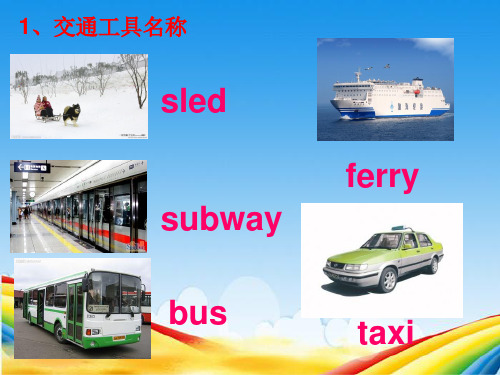
A. to C. a
B. / D. at
11. We go to Beijing ______ train.
A. in
B. at
C. by
12. How do you get to the USA ____China?
A. for
B. to
C. from
13. In the USA, people on bikes must ____ a helmet.
(.) _T_h_e_y_a_r_e__fr_o_m__m__y_c_o_u_s_i_n_i_n_t_h_e__U_S_A_._ 8. get, the, can, I, to, hospital, how
_H_o__w_c_a_n__I_g_e_t_t_o_t_h_e_h_o__s_p_it_a_l?_______
2. That’s good_________ A. exercise. B.a exercise C.the exercise D.excercises
3. What’s this? ________a helmet.
A. This is B. That is C. It’s D Its 4. The bus is__________.
1、交通工具名称
sled
subway
ferry
bus
taxi
2、频率副词
always > usually > often > sometimes > never
3、短语
慢下来:
slow down
注意:
pay attention to
交通信号灯:
traffic lights
Stop and wait at a red light .
小学六年级英语复习课《祈使句》精品教学课件
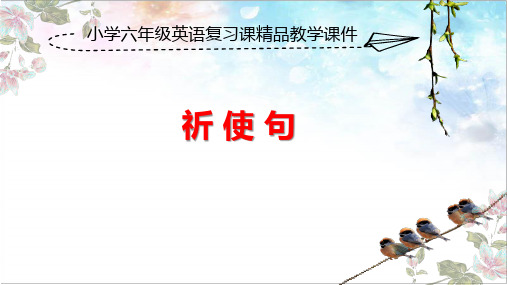
口诀: 使用祈使句,表示请求、命令或建议。 动词原形做开头,主语是you要省去。 句首Don't加动原,表示否定要注意。 Let's not加原形,也是一种否定句。 单词please表客气,句首句末没关系。
课堂练习:单项选择。
—____A____ help you.
—Thank you!
A.Let me
二、根据情景,选择正确的答案。
( )1.这里禁止吸烟,你应这样提醒大家:________
A.No parking!
B.No smoking!
C.No car!
( )2.在英语课上,老师对你说:________
A.Shout loudly, please. B.Read after me, please. C.Clean the room, please.
C.Go; turning
( )10.It's cold.________ the window, please.
A.Don't open
B.Don't cl要求完成下列句子。 1.You should keep the classroom clean.(改为祈使句) ________________________________________________________________________ 2.You can sit on the yellow chair.(改为祈使句) ________________________________________________________________________ 3.You must do your homework carefully.(改为祈使句) ________________________________________________________________________ 4.Take off your coat.(改为否定句) ________________________________________________________________________ 5.Water the flowers in the garden.(改为否定句) ________________________________________________________________________
小学六年级英语语法总复习PPT课件

.
• 小学阶段不规则动词全表
• Infinitive Past tense Infinitive
• 1. am, is
was
2. keep
• 3.are
were
5. make made
4.become
7. blow
blew
8. read
• 9. buy
bought
10. ride
• 11. catch caught
fly-flying walk-walking
jump-jumping sleep-sleeping
climb-climbing fight-fighting
swing-swinging drink-drinking catch-catching pick-picking
watch-watching play-playing
dance danced
变y为 i+ed
study studied
动词的过去式(不规则)
go-went read-read eat-ate sing-sang take-took buy-bought see-saw swim-swam am,is-was do-did are-were have-had get-got leave-left fly-flew stop-stopped(双写)
.
• 一般现在时的变化
1. be动词的变化。
否定句:主语+ be + not +其它。 如:He is not a worker.他不是工人 一般疑问句:Be +主语+其它。 如:-Are you a student? -Yes. I am. / No, I‘m not. 特殊疑问句:疑问词+一般疑问句。如:Where is my bike?
• 小学阶段不规则动词全表
• Infinitive Past tense Infinitive
• 1. am, is
was
2. keep
• 3.are
were
5. make made
4.become
7. blow
blew
8. read
• 9. buy
bought
10. ride
• 11. catch caught
fly-flying walk-walking
jump-jumping sleep-sleeping
climb-climbing fight-fighting
swing-swinging drink-drinking catch-catching pick-picking
watch-watching play-playing
dance danced
变y为 i+ed
study studied
动词的过去式(不规则)
go-went read-read eat-ate sing-sang take-took buy-bought see-saw swim-swam am,is-was do-did are-were have-had get-got leave-left fly-flew stop-stopped(双写)
.
• 一般现在时的变化
1. be动词的变化。
否定句:主语+ be + not +其它。 如:He is not a worker.他不是工人 一般疑问句:Be +主语+其它。 如:-Are you a student? -Yes. I am. / No, I‘m not. 特殊疑问句:疑问词+一般疑问句。如:Where is my bike?
小学六年级英语语法复习ppt课件

小学六年级英语
.
.
.
.
• 写出下列各词的复数 I _________him _________this ___________her ______ watch _______child _______photo ________diary ______
man______ woman_______ paper_______ juice___________ water________ milk________ rice__________ tea__________
.
• 2.行为动词:主语+行为动词(+其它)。如: We study English.我们学习英语。 当主语为第三人称单数(he, she,it)
时,要在动词后加"-s"或"-es"。如: Mary likes Chinese.玛丽喜欢汉语。
.
• 二、用括号内动词的适当形式填空。 1. He often ________(have) dinner at home. 2. Daniel and Tommy _______(be) in Class One. 3. We _______(not watch) TV on Monday. 4. Nick _______(not go) to the zoo on Sunday. 5. ______ they ________(like) the World Cup?
• 6, 用在序数词,方位词前和形容词最高级前, the first , the east, the tallest
.
• 3、零冠词(不用定冠词) (1)名词前已有作定语用的this, that, these, those, my, your, his, her, our, their, some等限 定词时,不用冠词。如:this eraser, her pencilbox, some boxes, those women等。 (2)泛指的不可数名词前一般不用冠词。如:meat, rice, water, bread, tea, milk, juice等。 (3)复数名词表示泛指时,不用冠词。如: the people in the room are doctors. 房间里的那 些人是医生。 (4)在表示学科的名词前一般不用冠词。如: Chinese, English, math, physics, history等。在 三餐饭和球类运动名词前一般不加冠词。如:have breakfast/ lunch/ supper, play basketball/ football等。 (5)在季节、节日、星期、月份前不用冠词。如: autumn, summer, winter, spring, Teachers’ day, Children’s day, Sunday, February等。 (6)在表颜色、语种和国家名词前不用冠词。如: white, brown, French, Australia等。 (7)在表示称呼语的名词之前,以及职务、头衔的 名词前不用冠词。如:Docto.r green is a scientist. 格林博士是位科学家。
.
.
.
.
• 写出下列各词的复数 I _________him _________this ___________her ______ watch _______child _______photo ________diary ______
man______ woman_______ paper_______ juice___________ water________ milk________ rice__________ tea__________
.
• 2.行为动词:主语+行为动词(+其它)。如: We study English.我们学习英语。 当主语为第三人称单数(he, she,it)
时,要在动词后加"-s"或"-es"。如: Mary likes Chinese.玛丽喜欢汉语。
.
• 二、用括号内动词的适当形式填空。 1. He often ________(have) dinner at home. 2. Daniel and Tommy _______(be) in Class One. 3. We _______(not watch) TV on Monday. 4. Nick _______(not go) to the zoo on Sunday. 5. ______ they ________(like) the World Cup?
• 6, 用在序数词,方位词前和形容词最高级前, the first , the east, the tallest
.
• 3、零冠词(不用定冠词) (1)名词前已有作定语用的this, that, these, those, my, your, his, her, our, their, some等限 定词时,不用冠词。如:this eraser, her pencilbox, some boxes, those women等。 (2)泛指的不可数名词前一般不用冠词。如:meat, rice, water, bread, tea, milk, juice等。 (3)复数名词表示泛指时,不用冠词。如: the people in the room are doctors. 房间里的那 些人是医生。 (4)在表示学科的名词前一般不用冠词。如: Chinese, English, math, physics, history等。在 三餐饭和球类运动名词前一般不加冠词。如:have breakfast/ lunch/ supper, play basketball/ football等。 (5)在季节、节日、星期、月份前不用冠词。如: autumn, summer, winter, spring, Teachers’ day, Children’s day, Sunday, February等。 (6)在表颜色、语种和国家名词前不用冠词。如: white, brown, French, Australia等。 (7)在表示称呼语的名词之前,以及职务、头衔的 名词前不用冠词。如:Docto.r green is a scientist. 格林博士是位科学家。
PEP人教版小学英语六年级下册期末复习课件(全册)
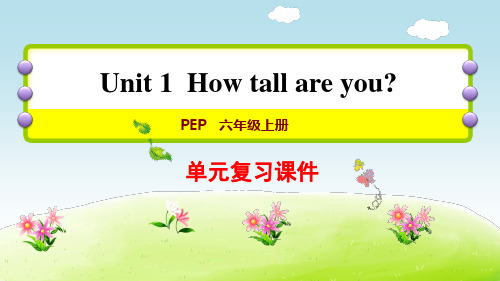
更小的 __s_m_a_l_l_er__ 12岁_1_2__y_e_a_r_s_o_ld__ 多重__h_o_w__h_e_a_v_y__
更强壮的__st_r_o_n_g_e_r 多高__h_o_w__t_a_l_l __ 多少号__w_h_a_t__si_z_e_
任务二:翻译重点句型 (两人一组,正确读出句子并翻译成汉语可得2分)
游戏规则: 按要求每完成一项任务即可获得相应的 分数,满10分即可获得一张王牌。
任务一:在习题本上写出下列单词或词组的过去 式并翻译成汉语,全部正确可得2分。
go_____w_e_n_t__去_______ ride__ro_d_e__骑__(__马__;__自__行__车__)_ hurt_h_u_r_t__(__使__)__受__伤__ eat_____a_te__吃_________ take ___t_o_o_k___拍__照_____ buy___b_o_u_g_h_t___买______ fall____fe_l_l__摔__倒_______ laugh____la_u_g_h_e_d___笑____
beautiful—more beautiful—most beautiful
任务四:看例子,说语法,学解题 (听老师讲例句,然后做下一页习题,全对可得2分)
You are__o_ld_e_r__ than me. 你比我年龄大。
解析: 这是用于比较两个人或事物的常见句型,句型 结构是:主语+be动词(am\is\are)+比较级+than+宾语。 年龄大用old,其比较级是older.
任务一:在习题本上写出下列单词的过去式并且
翻译成汉语,全部正确可得2分。
clean __c_le_a_n_e_d_打__扫___
小学六年级下册英语小升初时态课件(通用版) 一般过去时总复习2

4.疑问was/were调句首
• Were you at home the day before yesterday﹖ • Was she happy this morning﹖
肯定回答 Yes, 主语+was/were. 否定回答 No, 主语+wasn't/weren't. Were Xiao Qiang and Xiao Long here just now﹖
• yesterday或以其构成的短语: • yesterday morning • yesterday afternoon • yesterday evening • the day before yesterday
three days ago
Miss Zhu went to Tiantian Market three days ago.
其他家族
Long long ago
yesterday Now
一般过去时 yesterday ago just now in the old days in those days in 1980 the other day at that time once upon a time
一般将来时
现在 进行
• 现在学过的常用的表示过去的时间状语有: just now,a moment ago,yesterday,last week,last night, last weekend,last year,last month,three days ago,two weeks ago,five years ago…
• (3)末尾只有一个元音字母和一个辅音字母的重读闭音节,应 双写末尾的辅音字母,再加-ed,如:stop-stopped, shop-
六年级下册英语课件小升初总复习语法要点 全国通用(共26张PPT)
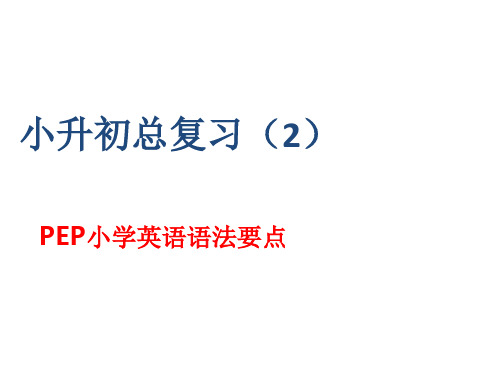
⑶带有was或were的句子,其否定、疑问的变 化和is, am, are一样,即否定句在was或were 后加not,一般疑问句把was或were调到句首。 3.句中没有be动词的一般过去时的句子
否定句:didn’t +动词原形,如:Jim didn’t go home yesterday.
一般疑问句:在句首加did,句子中的动词过 去式变回原形。如:Did Jim go home yesterday?
一般现在时的构成
1. be动词:主语+be(am,is,are)+其它。 如: I am a boy.我是一个男孩。He is a student .他是一个学生 2.行为动词:主语+行为动词(+其它)。 如: We study English.我们学习英语。 当主语为第三人称单数(he, she,it)时, 要在动词后加"-s"或"-es"。如:Mary likes Chinese.玛丽喜欢汉语。
小升初总复习(2)
PEP小学英语语法要点
一、 一般现在时:
1.表示事物或人物的特征、状态。
如:The sky is blue.天空是蓝色的。 He is a boy 他是个男孩 she has long hair .她有长头发
2.表示经常性或习惯性的动作。如:I get up at six every day.我每天六 点起床。一般的时间词有:often , sometimes ,everyday ,usually
3、there be 句型的否定句在be 动词后加not , 一般疑问句把be 动词调到句首。
4、there be句型与have(has) 的区别: there be 表示在某地有某物(或人); have(has) 表示某人拥有某物。 5、some 和any 在there be 句型中的运用: some 用于肯定句, any 用于否定句或疑问句。
小学英语六年级下册专题复习——名词(课件)
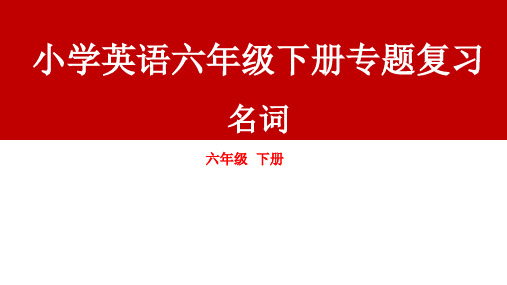
“ ’s ” “’”
“ ’s ” “’”
You can draw a mindmap in your way.
YOUR LOGO
I WIAH I LIVED HERE
Homework 1.完善思维导图。 2.完成同步课课练。
YOUR LOGO
I WIAH I LIVED HERE
Goodbye!
man__________
Let's check
desks buses familyies days knikvnesife
gigrilrsl wawtachtcehs partiyes keys leavfes
YOUR LOGO
I WIAH I LIVED HERE
Let's check
potatoes photos Chinese mmeann chchilidldren
小学英语六年级下册专题复习
名词
六年级 下册
仕版奋扬学校:何浇桐 霞石善祥学校:李淑铭,黎乐仪
名词专题
Watch and answer
1.Who went shopping?
YOUR LOGO
I WIAH I LIVED HERE
2.What did they buy in the supermarket?
the boy’s legs
the pens of Mr Jones
Mr Jones' pens
the keys of the men
the men’s
keys
the songs of the teachers
the teachers' songs
Hooray!
小学英语六年级毕业考试复习课件 专题六 交际用语 问路、指路(小声初)PPT课件
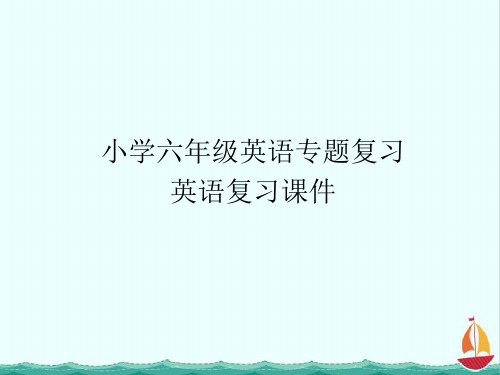
The entrance is on your left.
Read maps
Turn left when you come to the corner of the road
Cross the road
Walk along this road.
Cross the road . The entrance is in front
beside the bank / next to the bank on the left of the bank
Park
Post office
across from the park
Road signs
turn right
turn left
straight on
zebra crossing
You must wait.
行三分钟即到。 • Cross the street, walk on and take the second turning
on the right, it’s three minutes’ walk. • 非常谢谢。 • Thanks a lot. • 不用谢。 • Not at all.
Summarization
You can cross the road.
at traffic lights
crossroads
• Is this the way to…?
• Where is…?
• How can / do I get to …?
• Can / could you tell me the way to …?
6.斑马线 7.在你的左边
zebra crossing on your left
冀教版小学英语六年级上册Unit3 Winter in Canada复习课课件

03
It’s warm and sunny
04
My favourite season is … Because…
The sentences
05 What do you know about seasons?
Seasons winter spring summer autumn
Weather
cold and snowy warm and rainy hot and sunny cool and windy
02
What are they?
03
What’s the weather like in spring?
04
What is your favourite season? Why?
The sentences
01 There are four seasons in a year.
02
What are they?
03
What’s the weather like in spring?
04
What is your favourite season? Why?
The sentences
01 There are four seasons in a year.
02 They are spring summer autumn and winter.
标志
时间 状语
now,listen,look...
tomorrow/ next week / on Sunday/in 2023...
Now I am putting on my scarf. I am going to put on my coat. 例 He is putting on his winter hat. He is going to put on his winter coat. 句 Look!They are flying a kite. They are going out to play with
外研版(三起)六年级英语上册复习课件

一般现在时:肯定句
定义:表达经常性或习惯性的动作、表示现在的状态、表示普遍事实或真理。
结构:主语为第一、第二人称、第三人称复数:主语 + 动词原形 + 其他. 例如: I do my homework every night. 结构:主语为第三人称单数:主语 + 动词三单形式 + 其他. 例如: Oscar usually goes to school by bike.
1.肯定句:主语+have/has got+某物. E.g. I have got a new bike. 我有一辆新的自行车。 E.g. He has got a Chinese kite. 他有一个中国风筝。 2.否定句(在have或has后加not) E.g. I haven't got a new bike. 我有一辆新的自行车。 E.g. He hasn’t got a Chinese kite. 他有一个中国风筝。
重点短语
look at 看
a picture of 一张…图画
from…to… 从...到...
in the middle of 在…的中心
send an email to给...发送一封电子邮件
collect stamps 收集邮票
have got 拥有
sing songs 唱歌
lots of fun许多乐趣
E.g. Can you run? Yes, I can.
代词
主格 I
you he she it
we
you they
人称代词 宾格 me you him her it
us
you them
汉语 我
形容词 性
期末复习(课件)湘少版英语六年级下册
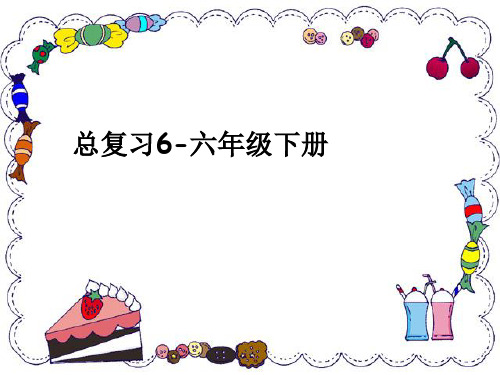
Tree Planting Day is on 12th March.
keep the air clean
We should
keep us cool
plant trees to
make the place beautiful
( B)1. The book is ______ animals.
A.to B.about C.from
比较级3:A like .... more than B
1.These stroies m__o_re__in_t_e_r_e_sting (interesting) than
others.
stroies
2, Theresawriemmmainngy magic ________(storruyn)n. ing
What should we do to be strong?
We should do exercise every day.
We can run, jog, swim, and take a long walks.
What should we do to be happy?
We can sing, dance and draw.
play the piano
want to 想要
I want to play the piano.
I wanted to play the piano yesterday.
Let's Practise
I went to...BH..eainjignzghou I saw..t.h..e GWreesattLWakaell I took a picture of ..t.h.e GWreesattLWakaell I enjoyed walking on the GbrriedagteWall.
小学六年级英语复习课《感叹句》精品教学课件
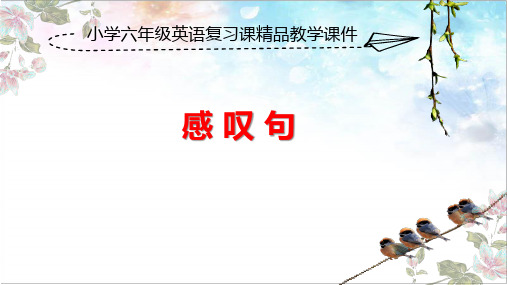
A.How
B.What a
( )5.—Look at the students.
—________ excited (兴奋的)!
A.What a
B.What an
C.How a C.What a
C.You're C.What
C.How
( )6.________ fast the car is running!
________ ________ food! 5.The news is sad.(改为感叹句) ________ sad the news ________! 6.How beautiful the city is!(改为同义句)
________ a ________ city it is! 7.How dirty the bedroom is!(改为同义句)
四、按要求完成下列句子。 1.It's a lovely dog.(改为感叹句)
________ ________ lovely dog it is! 2.They are magic clothes.(改为感叹句)
________ ________ clothes they are! 3.The film is very interesting.(改为感叹句) ________ interesting the film ________! 4.The food is yummy.(改为感叹句)
课堂过关训练:
一、用What或How填空。 1.________ a good boy! 2.________ beautiful pictures they are! 3.________ happy the children are! 4.________ boring the film is! 5.________ bad rice it is! 6.________ time flies! 7.________ well the boys are singing! 8.________ a cheap skirt it is! 9.________ hard the work is! 10.________ hard work it is!
新版小学六年级英语上册unit4复习课件

1. Lee likes doing sports. He often _____ sports in the afternoon. 2. Zhou Min and John like doing word puzzles. They often _____ word puzzles after school. 3. Mingming is good at basketball. He often ______ basketball in the evening. 4. My mom likes cooking. Today she _____ Chinese food for us. 5. Alice is from the UK. She lives in China now. She ______ (学习) Chinese. She likes _____ Chinese. 6. ______ Oliver _____ word puzzles every day? No, he doesn’t. He ______ stories.
He likes reading stories, doing kung fu, swimming and singing. W w .X k b 1.c O m 3. Where does he live? He lives on a farm. 4. Does he like singing songs? Yes, he does. He likes singing songs very much. 5. Does he live in the city? No, he doesn’t live in the city. He lives on a farm.
12. Uncle Bill is a teacher. He ______ English. He ______ newspapers every day. He ______ TV at night. He _____ to work by bus. 13. math. He _____ newspapers after lunch. He ____ to work by subway. He ______ home at 5:30. He ______ TV in the evening. He _____ to bed at 10. 14. My aunt is a nurse. She _____ in a hospital. She _____ to work by car. 15. He loves to ______ the pipa. He ______ every day. 16. My partner likes singing and dancing. She ______ and _____ every afternoon.
- 1、下载文档前请自行甄别文档内容的完整性,平台不提供额外的编辑、内容补充、找答案等附加服务。
- 2、"仅部分预览"的文档,不可在线预览部分如存在完整性等问题,可反馈申请退款(可完整预览的文档不适用该条件!)。
- 3、如文档侵犯您的权益,请联系客服反馈,我们会尽快为您处理(人工客服工作时间:9:00-18:30)。
boat (小船) ball (球) kite (风筝) balloon (气球) car (小汽车) plane (飞机)
• 5、早上相见应该说-――A: Good morning. • • • • • • • •
早上
• •
好! B: Good morning! 早上好! 6、下午相见应该说――A: Good afternoon! 下 午好! B: Good afternoon! 下午好! 7、跟新朋友第一次见面――A: Nice to meet you! 见到你很高兴。 B: Nice to meet you,too! 见到你也很高兴! 8、 A: Let’s go to school! 让我们一起去上学! B: OK! 好的。 9、看见久未见面的朋友或者别人身体不舒服,你 该这么打招呼- A: How are you ? 你好吗? B: Fine,thank you我很好,谢谢你。
• Unit 2身体部位: • head (头) face( 脸) • nose (鼻子) mouth
(嘴) • eye (眼睛) leg (腿) • ear (耳朵) arm (胳膊) finger (手指) leg (腿) • foot (脚) body (身体)
eye 1
9
head
nose 2
西瓜apple 苹果banana 香蕉strawberry 草 莓grape 葡萄like 喜欢some 一些;某些 thanks 多谢
Unit 5 bus 公共汽车bike 自行车taxi 出租 车jeep 吉普车desk 课桌chair 椅子 Walkman 随身听lamp 台灯your 你 的;你们的 zoo 动物园
chicken (鸡肉) French fries (炸薯条) • coke (可乐) juice (果汁) • milk (牛奶) water (水) tea (茶) coffee (咖啡)
• Unit 6数字: • one (一) two (二) • three (三) four (四) • five (五) six( 六) • seven (七) eight (八) • nine( 九) ten( 十) doll (玩具娃娃)
• Unit 2 • father 父亲;爸爸dad 爸爸 口语mother 母亲; • •
妈妈mom 妈妈 口语man 男人 woman 女人grandmother 外/祖母grandma (口 语)外/祖母grandfather(外)祖父 grandpa (口语)(外)祖父sister 姐妹brother 兄妹let’s=let us 让我们 great 太好了really 真地; 确切地and 和;并且how 多么;怎么样
• 三年级下册 • 【四会单词】 • Unit 1 • boy 男孩girl 女孩teacher 教师student 学生
this 这my 我的friend 朋友I’m=I am 我是 nice 好的;愉快的good morning 早上好 good afternoon 下午好meet 遇见;碰见 • goodbye 再见too 也;太
承认错误时
• • • • • • • • • • • • • •
Unit 2 Who’s that woman? 那个女人是谁? She’s my mother. 她是我的妈妈。 Who’s that man? 那个男人是谁? He’s my father. 他是我的爸爸。 Is she your sister? 她是你的妹妹吗? Yes,she is.\No ,she isn’t. 是的,她是。\不,她不是。 Is he your brother? 他是你的弟弟吗? Yes, he is. \ No, he isn’t. 是的,他是。\不,他不是。 5、This is my family. 这是我的家庭。 6、Come on,BaiLing. 快来,百灵。 7、Let’s watch TV. 让我们一起看电视吧! 8、How funny! 真有趣啊! How beautiful! 真漂亮啊! 9、What a big fish! 好大的一条鱼啊
• 10、A: Let’s paint. 让我们画画。 • B: Great! 棒极了! • 11、 A: Look I have a rabbit\monkey. 看,我有一只 • • • • • • • • •
兔子\猴子。 B: Cool\Super \ Great \ Wow! 酷\超级好\棒极了\好厉 害. 12、你想看下别人的东西,你该这么说―― A: May I have a look? 我可以看一看吗? B: Sure. Here you are! 当然可以。给你! 13、请别人吃东西,你该这么说―― A: Have some French fries. 吃一些炸薯条。 B: Thank you.\ No, thanks. 谢谢你。\不,谢谢你。 14、A: What do you like? 你喜欢什么? B: I like hot dogs. 我喜欢热狗。
• 1、向别人问好应该说A: Hello! (你好!) • B: Hi! (你好!) • 2、问别人的名字应该说A:What’s your
name? 你的名字是什么? • B:My name’s Chen Jie. 我的名字是陈 洁。 • 3、跟别人再见应该说――A: Bye.\ Good bye!(再见) • B: See you.(再见) \ Goodbye.(再见) • 4、 A: I have a pencil\ bag\ruler 我有一 只铅笔\书包\尺子。 • B: Me too . 我也有。
认真复习
• 重点单词
• Unit 1 • 学习文具:pen (钢笔) • pencil (铅笔) • pencil-case ( 铅笔盒) • ruler(尺子) • eraser(橡皮) • crayon (蜡笔) book (书) • bag (书包) sharpener (卷笔刀)
school (学校)
• • • • • • • • • • • • •
15、你想吃点东西,你该说―― A: Can I have some chicken? 我能吃一些鸡肉? B: Sure here you are. 当然可以,给你。 16、A: Thank you. 谢谢你。 B: You're welcome. 别客气。 17、A:B: Happy birthday. 生日快乐! B: Thank you. 谢谢。 18、A: How old are you? 你几岁啦? B: I’m nine. 我九岁了。(要用数字回答哦!) 19、A: Let's eat the birthday cake. 让我们吃生日蛋糕 B: Great! 棒极了! 20、A: How many balloons\ gifts? 多少个气球\礼物? B: Four \ ten. 四/十。
• Unit 6
small 小的big 大的long 长的short 短的; 矮的tall 高的giraffe 长颈鹿deer 鹿 PRC CAN UK USA A.M.(a.m.) P.M.(p.m.)
【三会句型】 Unit 1 1、Hi! /Hello! 你好! ——用于比较熟悉的人打招呼 2、I’m Amy. 我叫埃米。 ——用于自我介绍 3、Where are you from? 你来自哪里? ——用于问别人是哪儿人时 I’m from America /Canada /China. 我来自美国/加拿大/中国。——用于介绍来自
• • • • •
【三会句型】 Unit 1 1、Hi! /Hello! 你好! ——用于比较熟悉的人打招呼 2、I’m Amy. 我叫埃米。 ——用于自我介绍 3、Where are you from? 你来自哪里? ——用于问别人是
• I’m from America /Canada /China. 我来自美国/加拿大/中
哪儿人时
• • •
国。——用于介绍来自哪个国家 4、We have a new friend. 我们有一位新朋友。 5、Watch out! 小心! 6、Student: I’m sorry. 学生:对不起。——常用于抱歉、
• Teacher: It’s OK. Come in. 教师:没关系。进来。 • Happy Women’s Day! 妇女节快乐! • Thank you. 谢谢你们。
哪个国家
4、We have a new friend. 我们有一位新朋友。 5、Watch out! 小心! 6、Student: I’m sorry. 学生:对不起。——常用于抱歉、承认错误时 Teacher: It’s OK. Come in. 教师:没关系。进来。 Happy Women’s Day! 妇女节快乐! Thank you. 谢谢你们。
• Unit 4动物: • cat (猫) dog (狗) • monkey (猴子) panda (熊猫)
rabbit( 兔子) • pig (猪) • bear (熊) mouse (老鼠)
duck (鸭子) bird (鸟) elephant (大象) squirrel (松鼠)
• Unit 5食物: • cake (蛋糕) bread (面包) • hot dog (热狗) hamburger (汉堡包)
• • • • • • • • • • • • •
Unit 3 1、How many kites can you see? 你能看到多少只风筝? I can see 12. 我能看到十二只。 2、How many crayons do you have? 你有多少支蜡笔? I have 16. 我有十六支蜡笔。 3、The black one is a bird. 那个黑色的是一只鸟。 4、Look at my new crayons! 看我的新蜡笔! 5、Oh, how nice! 噢,真漂亮! 6、Open it and see! 打开它看看! 7、That’s right! 答对了! 8、Let’s pick up the apples. 让我们摘苹果吧! Let’s have a race. 让我们来比赛吧! 9、Good idea ! 好主意! 10、Who are you? I’m … 你是谁? 我是…… ——用于询问
• 5、早上相见应该说-――A: Good morning. • • • • • • • •
早上
• •
好! B: Good morning! 早上好! 6、下午相见应该说――A: Good afternoon! 下 午好! B: Good afternoon! 下午好! 7、跟新朋友第一次见面――A: Nice to meet you! 见到你很高兴。 B: Nice to meet you,too! 见到你也很高兴! 8、 A: Let’s go to school! 让我们一起去上学! B: OK! 好的。 9、看见久未见面的朋友或者别人身体不舒服,你 该这么打招呼- A: How are you ? 你好吗? B: Fine,thank you我很好,谢谢你。
• Unit 2身体部位: • head (头) face( 脸) • nose (鼻子) mouth
(嘴) • eye (眼睛) leg (腿) • ear (耳朵) arm (胳膊) finger (手指) leg (腿) • foot (脚) body (身体)
eye 1
9
head
nose 2
西瓜apple 苹果banana 香蕉strawberry 草 莓grape 葡萄like 喜欢some 一些;某些 thanks 多谢
Unit 5 bus 公共汽车bike 自行车taxi 出租 车jeep 吉普车desk 课桌chair 椅子 Walkman 随身听lamp 台灯your 你 的;你们的 zoo 动物园
chicken (鸡肉) French fries (炸薯条) • coke (可乐) juice (果汁) • milk (牛奶) water (水) tea (茶) coffee (咖啡)
• Unit 6数字: • one (一) two (二) • three (三) four (四) • five (五) six( 六) • seven (七) eight (八) • nine( 九) ten( 十) doll (玩具娃娃)
• Unit 2 • father 父亲;爸爸dad 爸爸 口语mother 母亲; • •
妈妈mom 妈妈 口语man 男人 woman 女人grandmother 外/祖母grandma (口 语)外/祖母grandfather(外)祖父 grandpa (口语)(外)祖父sister 姐妹brother 兄妹let’s=let us 让我们 great 太好了really 真地; 确切地and 和;并且how 多么;怎么样
• 三年级下册 • 【四会单词】 • Unit 1 • boy 男孩girl 女孩teacher 教师student 学生
this 这my 我的friend 朋友I’m=I am 我是 nice 好的;愉快的good morning 早上好 good afternoon 下午好meet 遇见;碰见 • goodbye 再见too 也;太
承认错误时
• • • • • • • • • • • • • •
Unit 2 Who’s that woman? 那个女人是谁? She’s my mother. 她是我的妈妈。 Who’s that man? 那个男人是谁? He’s my father. 他是我的爸爸。 Is she your sister? 她是你的妹妹吗? Yes,she is.\No ,she isn’t. 是的,她是。\不,她不是。 Is he your brother? 他是你的弟弟吗? Yes, he is. \ No, he isn’t. 是的,他是。\不,他不是。 5、This is my family. 这是我的家庭。 6、Come on,BaiLing. 快来,百灵。 7、Let’s watch TV. 让我们一起看电视吧! 8、How funny! 真有趣啊! How beautiful! 真漂亮啊! 9、What a big fish! 好大的一条鱼啊
• 10、A: Let’s paint. 让我们画画。 • B: Great! 棒极了! • 11、 A: Look I have a rabbit\monkey. 看,我有一只 • • • • • • • • •
兔子\猴子。 B: Cool\Super \ Great \ Wow! 酷\超级好\棒极了\好厉 害. 12、你想看下别人的东西,你该这么说―― A: May I have a look? 我可以看一看吗? B: Sure. Here you are! 当然可以。给你! 13、请别人吃东西,你该这么说―― A: Have some French fries. 吃一些炸薯条。 B: Thank you.\ No, thanks. 谢谢你。\不,谢谢你。 14、A: What do you like? 你喜欢什么? B: I like hot dogs. 我喜欢热狗。
• 1、向别人问好应该说A: Hello! (你好!) • B: Hi! (你好!) • 2、问别人的名字应该说A:What’s your
name? 你的名字是什么? • B:My name’s Chen Jie. 我的名字是陈 洁。 • 3、跟别人再见应该说――A: Bye.\ Good bye!(再见) • B: See you.(再见) \ Goodbye.(再见) • 4、 A: I have a pencil\ bag\ruler 我有一 只铅笔\书包\尺子。 • B: Me too . 我也有。
认真复习
• 重点单词
• Unit 1 • 学习文具:pen (钢笔) • pencil (铅笔) • pencil-case ( 铅笔盒) • ruler(尺子) • eraser(橡皮) • crayon (蜡笔) book (书) • bag (书包) sharpener (卷笔刀)
school (学校)
• • • • • • • • • • • • •
15、你想吃点东西,你该说―― A: Can I have some chicken? 我能吃一些鸡肉? B: Sure here you are. 当然可以,给你。 16、A: Thank you. 谢谢你。 B: You're welcome. 别客气。 17、A:B: Happy birthday. 生日快乐! B: Thank you. 谢谢。 18、A: How old are you? 你几岁啦? B: I’m nine. 我九岁了。(要用数字回答哦!) 19、A: Let's eat the birthday cake. 让我们吃生日蛋糕 B: Great! 棒极了! 20、A: How many balloons\ gifts? 多少个气球\礼物? B: Four \ ten. 四/十。
• Unit 6
small 小的big 大的long 长的short 短的; 矮的tall 高的giraffe 长颈鹿deer 鹿 PRC CAN UK USA A.M.(a.m.) P.M.(p.m.)
【三会句型】 Unit 1 1、Hi! /Hello! 你好! ——用于比较熟悉的人打招呼 2、I’m Amy. 我叫埃米。 ——用于自我介绍 3、Where are you from? 你来自哪里? ——用于问别人是哪儿人时 I’m from America /Canada /China. 我来自美国/加拿大/中国。——用于介绍来自
• • • • •
【三会句型】 Unit 1 1、Hi! /Hello! 你好! ——用于比较熟悉的人打招呼 2、I’m Amy. 我叫埃米。 ——用于自我介绍 3、Where are you from? 你来自哪里? ——用于问别人是
• I’m from America /Canada /China. 我来自美国/加拿大/中
哪儿人时
• • •
国。——用于介绍来自哪个国家 4、We have a new friend. 我们有一位新朋友。 5、Watch out! 小心! 6、Student: I’m sorry. 学生:对不起。——常用于抱歉、
• Teacher: It’s OK. Come in. 教师:没关系。进来。 • Happy Women’s Day! 妇女节快乐! • Thank you. 谢谢你们。
哪个国家
4、We have a new friend. 我们有一位新朋友。 5、Watch out! 小心! 6、Student: I’m sorry. 学生:对不起。——常用于抱歉、承认错误时 Teacher: It’s OK. Come in. 教师:没关系。进来。 Happy Women’s Day! 妇女节快乐! Thank you. 谢谢你们。
• Unit 4动物: • cat (猫) dog (狗) • monkey (猴子) panda (熊猫)
rabbit( 兔子) • pig (猪) • bear (熊) mouse (老鼠)
duck (鸭子) bird (鸟) elephant (大象) squirrel (松鼠)
• Unit 5食物: • cake (蛋糕) bread (面包) • hot dog (热狗) hamburger (汉堡包)
• • • • • • • • • • • • •
Unit 3 1、How many kites can you see? 你能看到多少只风筝? I can see 12. 我能看到十二只。 2、How many crayons do you have? 你有多少支蜡笔? I have 16. 我有十六支蜡笔。 3、The black one is a bird. 那个黑色的是一只鸟。 4、Look at my new crayons! 看我的新蜡笔! 5、Oh, how nice! 噢,真漂亮! 6、Open it and see! 打开它看看! 7、That’s right! 答对了! 8、Let’s pick up the apples. 让我们摘苹果吧! Let’s have a race. 让我们来比赛吧! 9、Good idea ! 好主意! 10、Who are you? I’m … 你是谁? 我是…… ——用于询问
